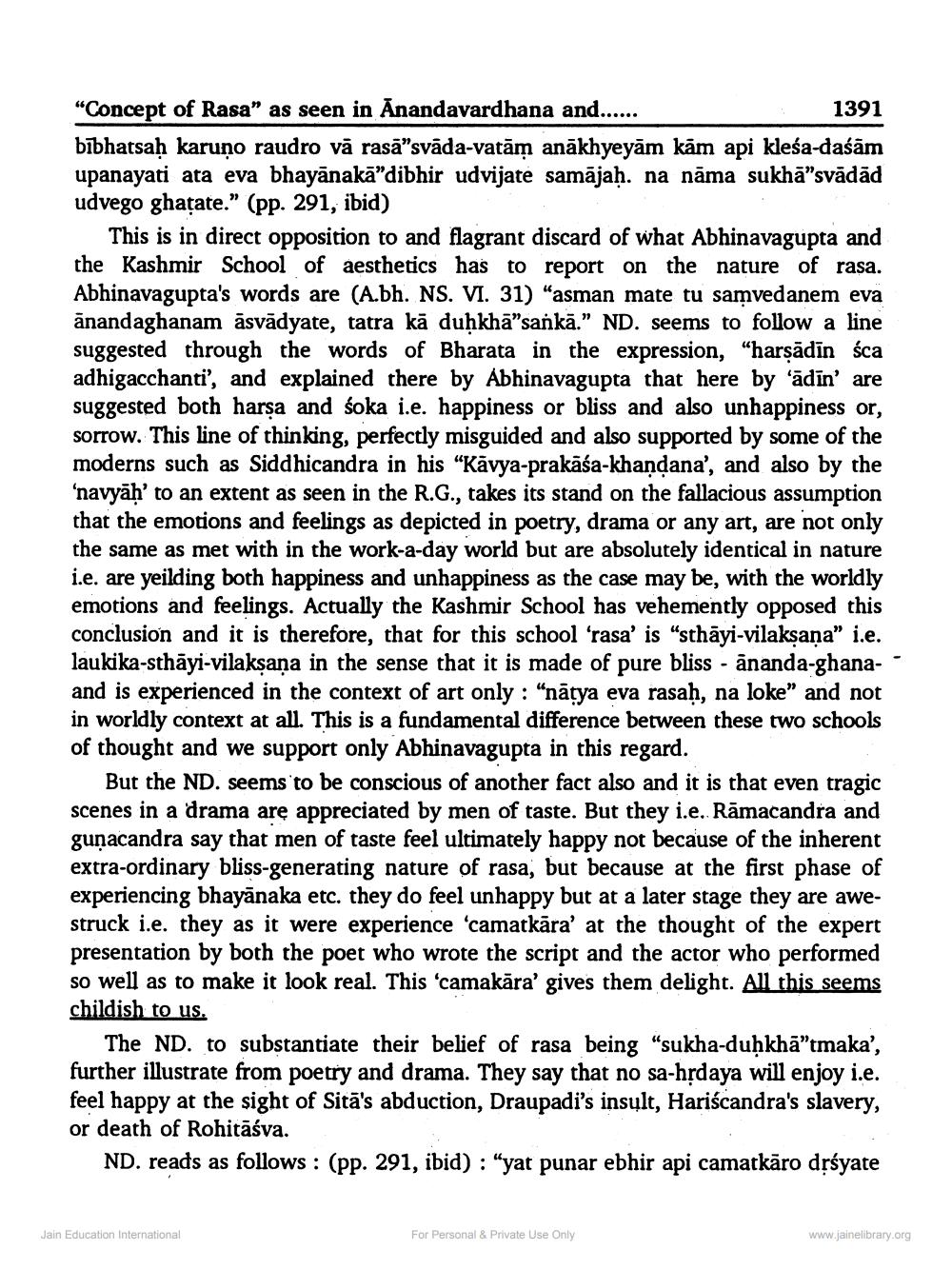________________
"Concept of Rasa" as seen in Anandavardhana and......
1391 bībhatsah karuņo raudro vā rasā"svāda-vatām anākhyeyām kām api klesa-daśām upanayati ata eva bhayānaka"dibhir udvijate samājah. na nāma sukhā"svādad udvego ghatate." (pp. 291, ibid)
This is in direct opposition to and flagrant discard of what Abhinavagupta and the Kashmir School of aesthetics has to report on the nature of rasa. Abhinavagupta's words are (A.bh. NS. VI. 31) "asman mate tu samvedanem eva ānandaghanam āsvādyate, tatra kā duḥkhā"sankā.” ND. seems to follow a line suggested through the words of Bharata in the expression, "harşādīn sca adhigacchanti', and explained there by Abhinavagupta that here by 'ādīn' are suggested both harşa and soka i.e. happiness or bliss and also unhappiness or, sorrow. This line of thinking, perfectly misguided and also supported by some of the moderns such as Siddhicandra in his "Kāvya-prakāśa-khandana', and also by the 'navyāh' to an extent as seen in the R.G., takes its stand on the fallacious assumption that the emotions and feelings as depicted in poetry, drama or any art, are not only the same as met with in the work-a-day world but are absolutely identical in nature i.e. are yeilding both happiness and unhappiness as the case may be, with the worldly emotions and feelings. Actually the Kashmir School has vehemently opposed this conclusion and it is therefore, that for this school 'rasa' is "sthāyi-vilaksana" i.e. laukika-sthāyi-vilaksaņa in the sense that it is made of pure bliss - ānanda-ghana-- and is experienced in the context of art only : “nātya eva rasaḥ, na loke” and not in worldly context at all. This is a fundamental difference between these two schools of thought and we support only Abhinavagupta in this regard.
But the ND. seems to be conscious of another fact also and it is that even tragic scenes in a drama are appreciated by men of taste. But they i.e. Rāmacandra and gunacandra say that men of taste feel ultimately happy not because of the inherent extra-ordinary bliss-generating nature of rasa, but because at the first phase of experiencing bhayānaka etc. they do feel unhappy but at a later stage they are awestruck i.e. they as it were experience 'camatkāra' at the thought of the expert presentation by both the poet who wrote the script and the actor who performed so well as to make it look real. This 'camakāra' gives them delight. All this seems childish to us.
The ND. to substantiate their belief of rasa being “sukha-duḥkhā”tmaka', further illustrate from poetry and drama. They say that no sa-hrdaya will enjoy i.e. feel happy at the sight of Sitā's abduction, Draupadi's insult, Hariscandra's slavery, or death of Rohitāśva.
ND. reads as follows : (pp. 291, ibid) : "yat punar ebhir api camatkāro drśyate
Jain Education International
For Personal & Private Use Only
www.jainelibrary.org




